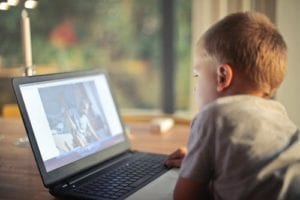Written by Joyce Smith, BS. This prospective study finds an association between increased use of electronic media and decreased academic performance in school children.
 A highly-debated hot topic is the abundant use of screen-based electronic media such as computers, smart phones, electronic video games and television viewing 1. While extremely popular among children and teenagers, electronic media is linked to an array of health issues, most notably excessive weight gain and sleep issues 2,3 and yet higher levels of electronic media usage provide the benefit of access to unlimited information, a greater social connection with peers, and improved technological skills 4. However, what remains unknown is a potential negative effect of heavy screen time and electronic media on academic performance. Television programs such as Sesame Street have undeniably improved academic performance, 5 while television viewing has hindered math performance and improved reading skills 6.
A highly-debated hot topic is the abundant use of screen-based electronic media such as computers, smart phones, electronic video games and television viewing 1. While extremely popular among children and teenagers, electronic media is linked to an array of health issues, most notably excessive weight gain and sleep issues 2,3 and yet higher levels of electronic media usage provide the benefit of access to unlimited information, a greater social connection with peers, and improved technological skills 4. However, what remains unknown is a potential negative effect of heavy screen time and electronic media on academic performance. Television programs such as Sesame Street have undeniably improved academic performance, 5 while television viewing has hindered math performance and improved reading skills 6.
To add clarity to the research inconsistencies, an Australian study 7 examined the long-term, cumulative effect of media use on academic performances of 1,239 school children, 8-9 years of age, in Melbourne, Australia. Data from national achievement tests was used to measure the children’s academic performance at baseline (3rd grade) and again two years later (5th grade). Parents reported their children’s use of electronic media. Adjusting for baseline academic performance and potential confounding variables, such as behavioral and emotional symptoms, body mass index (BMI), child’s sex, age at third grade, social and economic status of the families (SES), and prior media use, allowed the research team to determine whether cumulative and short term computer and television use was associated with poorer academic performance.
The researchers found that children who watched two or more hours of television per day at the age of 8 or 9 (3rd grade) had lower Grade 5 reading ability (measured by NAPLAN reading scores) at ages 10 and 11 compared to those who watched one hour or less. The difference in reading ability was equivalent to losing four months of learning. When looking at associations between the effects of media use on numeracy (the children’s ability to work with numbers), researchers found that after controlling for prior media exposure, 3rd grade children who used a computer for more than one hour per day (compared to those who spent no time on a computer) had lower 5th grade NAPLAN numeracy scores and experienced a similar 4 month delay in learning. However, the analysis revealed no short- or long- term association between the children’s use of videogames and their academic performance.
These study results are particularly poignant today, given the effects of the existing pandemic on children’s learning, whether learning transpires at home or in a physical classroom. As well, the impact of social distancing on children’s use of media remains an unknown.
Limitations include a written consent of only 54% of parents at recruitment which tended to be from areas of higher SES, a potential parental misreporting of media use, and no reporting on cell phone use.
Source: Mundy, Lisa K., Louise Canterford, Monsurul Hoq, Timothy Olds, Margarita Moreno-Betancur, Susan Sawyer, Silja Kosola, and George C. Patton. “Electronic media use and academic performance in late childhood: A longitudinal study.” PloS one 15, no. 9 (2020): e0237908.
© 2020 Mundy et al. This is an open access article distributed under the terms of the Creative Commons Attribution License, which permits unrestricted use, distribution, and reproduction in any medium, provided the original author and source are credited.
Posted September 24, 2020.
Joyce Smith, BS, is a degreed laboratory technologist. She received her bachelor of arts with a major in Chemistry and a minor in Biology from the University of Saskatchewan and her internship through the University of Saskatchewan College of Medicine and the Royal University Hospital in Saskatoon, Saskatchewan. She currently resides in Bloomingdale, IL.
References:
- Adelantado-Renau M, Moliner-Urdiales D, Cavero-Redondo I, Beltran-Valls MR, Martínez-Vizcaíno V, Álvarez-Bueno C. Association Between Screen Media Use and Academic Performance Among Children and Adolescents: A Systematic Review and Meta-analysis. JAMA Pediatr. 2019;173(11):1058-1067.
- Hancox RJ, Milne BJ, Poulton R. Association between child and adolescent television viewing and adult health: a longitudinal birth cohort study. Lancet. 2004;364(9430):257-262.
- Cain N, Gradisar M. Electronic media use and sleep in school-aged children and adolescents: A review. Sleep Med. 2010;11(8):735-742.
- O’Keeffe GS, Clarke-Pearson K. The impact of social media on children, adolescents, and families. Pediatrics. 2011;127(4):800-804.
- Hofferth SL. Home media and children’s achievement and behavior. Child Dev. 2010;81(5):1598-1619.
- Pagani LS, Fitzpatrick C, Barnett TA, Dubow E. Prospective associations between early childhood television exposure and academic, psychosocial, and physical well-being by middle childhood. Arch Pediatr Adolesc Med. 2010;164(5):425-431.
- Mundy LK, Canterford L, Hoq M, et al. Electronic media use and academic performance in late childhood: A longitudinal study. PLoS One. 2020;15(9):e0237908.
